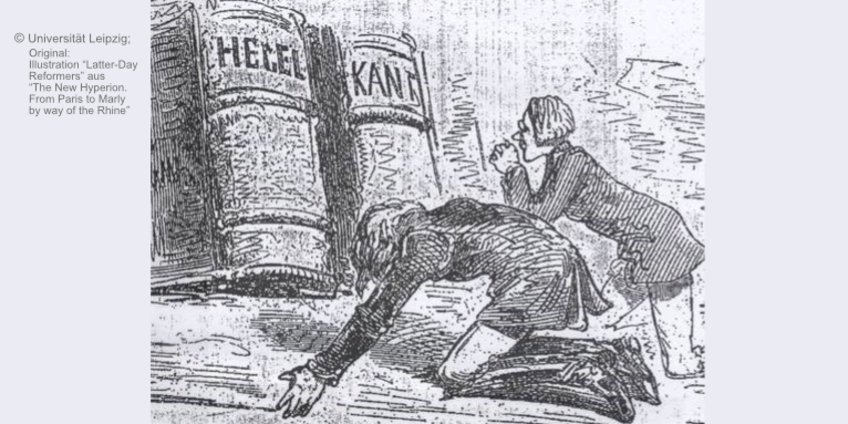
Reasonable Punishment?
The Influence of German Idealism on the Theory of Punishment
Workshop (in German): October 26–28, 2023 | Freiburg, Germany • Max Planck Institute for the Study of Crime, Security and Law
Despite the passage of two centuries, both historians of philosophy and legal scholars continue to grapple with the justifications of criminal law and state punishment put forth by Kant, Fichte, and Hegel. These historical perspectives continue to be of significance as they are often said to unveil core elements concerning the justification of punishment that hold true to this day. However, a fundamental question arises: to what extent are the “paradigmatic attributions” (e.g., Kant and Hegel as representatives of an absolute, Fichte of a relative theory of punishment) justified? Furthermore, the critical potential of these authors for contemporary theories of punishment is disputed. While some scholars directly link their work to Kant, Fichte, or Hegel, striving to assert their continued influence on present-day discourse, others reject a direct invocation of these theorists, pointing to insurmountable, metaphysically demanding presuppositions. This workshop, conducted in German, aims to confront these lingering unresolved concerns by bringing together philosophers and legal scholars working on fundamental questions. The goal is to reexamine the ongoing debate that has persisted in Germany since the late 18th century—namely, whether the justification for punishment should rest on retributive or preventative grounds. Through this evaluation, the workshop will critically explore the potential that these historical authors can have upon contemporary theory of punishment.
Program
| Thursday, October 26, 2023 | |
|---|---|
| 14:30 | Welcome and Introduction: Reasonable Punishment |
| 14:45–16:15 | Dieter Hüning (Trier) „daß das Strafen an und für sich gerecht sei“ (Rph § 99 Anm.) – Vernunft und Unvernunft der Hegelschen Strafrechtstheorie Martin Brecher (Mannheim) Vernunft und Vergeltung: Kants Theorie der Strafe |
| 16:15–17:00 | – Coffee break – |
| 17:00–18:30 | Michael Nance (Baltimore) Fichte’s Voluntarist Theory of Punishment Michelle Kosch (Ithaca) Fichte on Punishment and Conditions of Possibility of Citizenship |
| Friday, October 27, 2023 | |
| 09:30–11:00 | Franziska Dübgen (Münster) Idealistische Straftheorien im Spiegel ihrer Kritiker:innen Jean-Christophe Merle (Vechta/Saarbrücken) Das Böse und das Übel bei der Rechtfertigung der Strafe bei Kant, Fichte und Hegel |
| 11:00–11:30 | – Coffee break – |
| 11:30–13:00 | Antje du Bois-Pedain (Cambridge) Verfassungschaos und Strafrechtsvernunft: Kann Fichtes philosophischer Ansatz das Strafrecht im Verfassungsstaat rechtfertigen? Esther Neuhann (Berlin) „Adding Insult to Injury“: Fichte über Sexualstraftaten |
| 13:00–14:30 | – Lunch break – |
| 14:30–16:00 | Thomas Meyer (Berlin) Strafrecht als ‚Dasein des freien Willens‘ und Willensfreiheit als Bedingung für das Strafrecht Benno Zabel (Frankfurt am Main) Vernunft und Verletzlichkeit – Zur Theorie der Zwangsbefugnis bei Hegel und in der liberalen Strafrechtstheorie |
| 16:00–16:45 | – Coffee break – |
| 16:45–18:15 | Jochen Bung (Hamburg) Wie absolut ist die Straftheorie Hegels? Kristina Peters (Munich) Wie aktuell ist Hegels Straftheorie? |
| Saturday, October 28, 2023 | |
| 09:30–11:00 | Katja Stoppenbrink (Munich) Kants Straftheorie systematisch betrachtet: Vom Inselbeispiel zur Vereinigungstheorie? Philipp Hirsch (Freiburg) Strafe als Forderung der öffentlichen Gerechtigkeit: Immanuel Kant im Gespräch mit Günther Jakobs und Klaus Günther |
| 11:00–11:45 | – Coffee break – |
| 11:45–13:15 | Luna Rösinger (Bonn) Die Bedeutung einer Rechtsbegründung aus Freiheit für das Strafrecht – am Beispiel der Wolff-Schule Markus Abraham (Hamburg/Freiburg) Drei Argumente des Idealismus zur Strafe, die im Kern vernünftig scheinen |
About us

The workshop is organized by Dr. Dr. Philipp-Alexander Hirsch, Dr. Markus Abraham, and Dr. Martin Brecher.
Markus Abraham is a research associate at the Chair of Criminal Law and Legal Philosophy (Prof. Dr. Jochen Bung) at the University of Hamburg. He conducts research on criminal law and criminal procedure as well as their philosophical foundations.
Martin Brecher is an academic associate at the Chair of Philosophy II at the University of Mannheim. His research focuses on Immanuel Kant’s philosophy as well as on the moral, legal, and political philosophy of the modern era, especially on the natural law of the Age of Enlightenment.
Philipp-Alexander Hirsch is Leader of the Independent Research Group “Criminal Law Theory” at the Max Planck Institute for the Study of Crime, Security and Law in Freiburg. His research focuses on criminal law and criminal procedure, legal philosophy and legal theory, and the history and philosophy of criminal law in the Age of Enlightenment.
The Max Planck Research Group “Criminal Law Theory” focuses on the analysis of substantive criminal law and criminal procedure and the doctrine in these areas; the analysis centers on the underlying normative structures and principles in order to assess their coherence, justifiability, and persuasiveness. The aim is to draw on the fruits of this analysis to engage in normative theory-building that proposes solutions to problems in criminal law that go beyond interpreting the positive law.
Short Summary and Picture Gallery
The workshop, which took place at the end of October 2023 at the Max Planck Institute for the Study of Crime, Security and Law in Freiburg i. Br., brought together philosophers and legal scholars to discuss the content and potential of Kant's, Hegel's and Fichte's theories of punishment. In addition to the different reasoning approaches of the thinkers of German idealism, it was discussed in particular whether their positions still have an impact on the theory of punishment today and to what extent they can benefit the discourse on the theory of punishment. Stimulating discussions accompanied the lectures, which will also be published in written form in a workshop volume.
Photos: © MPI-CSL
Workshop Report (JuristenZeitung)
The detailed workshop report (in German), written by Andrés Payer, Patrick Joseph Siegle and Valerij Zisman, has been published in the JuristenZeitung:











